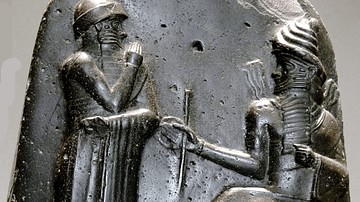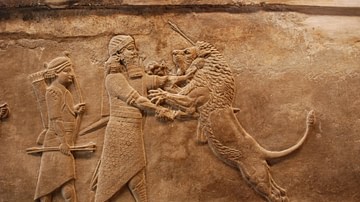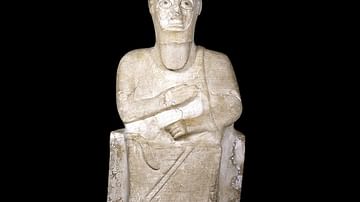Search
Did you mean: Kassite?
Search Results

Image
Babylon at the time of the Kassites
A map of the Babylonian Empire during the time of the Kassites, roughly the 13th century BC. This map shows the probable river courses and coastline at that time.

Definition
Hammurabi
Hammurabi (r. 1792-1750 BCE) was the sixth king of the Amorite First Dynasty of Babylon best known for his famous law code which served as the model for others, including the Mosaic Law of the Bible. He was the first ruler able to successfully...

Definition
Mesopotamia
Mesopotamia (from the Greek, meaning 'between two rivers') was an ancient region located in the eastern Mediterranean bounded in the northeast by the Zagros Mountains and in the southeast by the Arabian Plateau, corresponding to modern-day...

Definition
Kassite
It is thought that the Kassites originated as tribal groups in the Zagros Mountains to the north-east of Babylonia. Their leaders came to power in Babylon following the collapse of the ruling dynasty of the Old Babylonian Period in 1595 BC...

Definition
Babylon
Babylon is the most famous city from ancient Mesopotamia whose ruins lie in modern-day Iraq 59 miles (94 km) southwest of Baghdad. The name is derived from bav-il or bav-ilim, which in Akkadian meant "Gate of God" (or "Gate of the Gods"...

Definition
Amorite
The Amorites were a Semitic people who seem to have emerged from western Mesopotamia (modern-day Syria) at some point prior to the 3rd millennium BCE. In Sumerian they were known as the Martu or the Tidnum (in the Ur III Period), in Akkadian...

Image
Ancient Near East c.1500-1300 BCE - The Old Hittite Collapse and the Rise of Kassites, Mitanni, and the New Kingdom of Egypt
This map illustrates the geopolitical landscape of the ancient Near East following the destructive campaigns of the Old Hittite Empire (circa 1650–1500 BCE), which triggered widespread upheaval and realigned regional power structures. In...

Image
Mitanni Empire, c.1500-1300 BCE - Between Egypt and the Hittites, A Kingdom of Diplomacy and War
This map illustrates the rise and fall of the Mitanni Empire, an influential Indo-Iranian state that emerged in northern Mesopotamia during the Late Bronze Age. At its height around 1500 BCE, Mitanni controlled a vast territory stretching...

Definition
Mesopotamian Art and Architecture
Ancient Mesopotamian art and architectural works are among the oldest in the world, dating back over 7,000 years. The works first appear in northern Mesopotamia prior to the Ubaid Period (c. 5000-4100 BCE) and then developed in the south...

Definition
Code of Hammurabi
The Code of Hammurabi was a set of 282 laws inscribed in stone by the Babylonian king Hammurabi (r. 1795-1750 BCE) who conquered and then ruled ancient Mesopotamia. Although his law code was not the first, it was the most clearly defined...